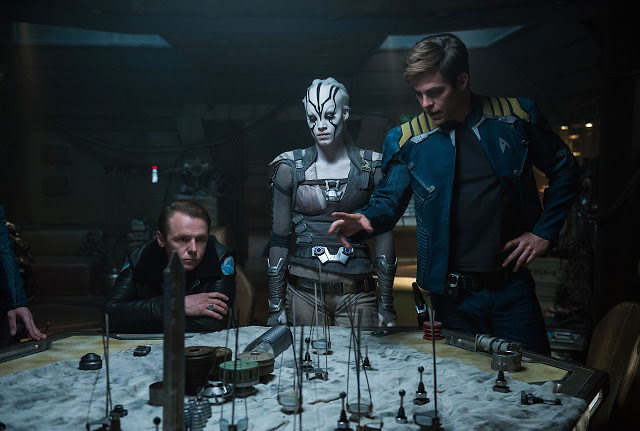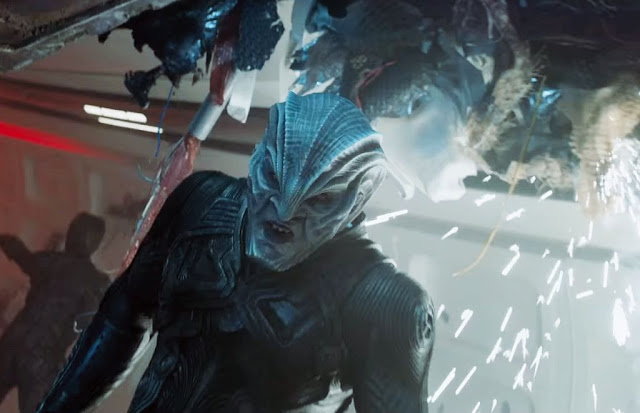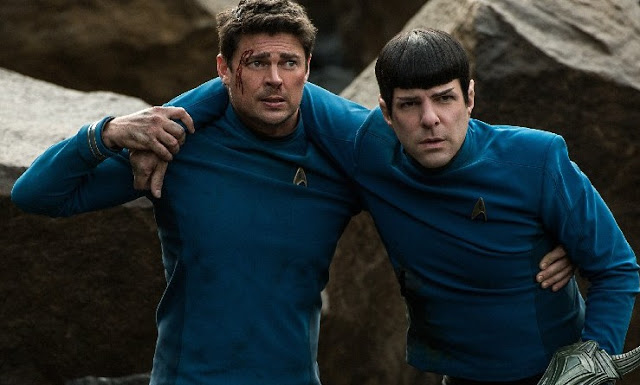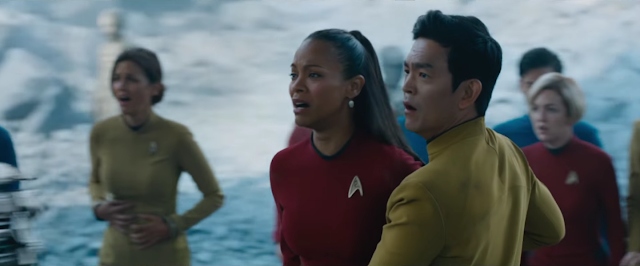“Things have started to feel a little episodic,” Jim Kirk confesses at the beginning of Star Trek Beyond, the fleet and fun third installment of the rebooted Star Trek franchise. He’s musing about his role overseeing the increasingly routine voyages of the Starship Enterprise, but it doesn’t require a doctorate in meta to connect his observations to the other vehicle he’s piloting, namely the Star Trek franchise itself. Kirk’s opening voiceover articulates the central challenge that every studio-sanctioned cinematic series faces: How do you continue serving your fans but prevent the proceedings from growing stale? Can you deliver something more without just providing more of the same?
Star Trek Beyond—directed by Fast & Furious veteran Justin Lin, taking the reins from J.J. Abrams (who has since migrated to a different galaxy)—doesn’t entirely solve this paradox, but it does thread the needle about as well as a big-budget three-quel can. Light and lively, with a refreshing focus on character and a blessed scarcity of mind-numbing spectacle, it’s a satisfying continuation, one that cannily plays up the franchise’s strengths (interpersonal dynamics, cheeky comedy) while minimizing its weaknesses (lack of stakes, weightless space battles). It may be just another episode in the adventures of the Enterprise crew, but it’s a damn good episode.
Oddly enough, it starts out bumpy. (In an era where most franchise fare hooks viewers early only to lumber toward a clanging finish, Beyond inverts the formula; it actually gets better as it goes along.) After a pointless prologue that exists for no reason other than to serve up a (very funny) sight gag, Beyond finds Capt. Kirk (Chris Pine, comfortable) and the gang on a perilous reconnaissance mission in the deep-space nebula. Or something like that. The details don’t much matter, not once the Enterprise is attacked by a throng of tiny vessels that, in one of the movie’s best images, swarm Kirk’s mother ship like an angry horde. These insect-like ships are doing the bidding of a seething malcontent named Krall, though he may as well be called The Poor Sap Following Benedict Cumberbatch.
As the sneering supervillain of the prior Star Trek film, the not-bad Into Darkness, Cumberbatch gave a deliciously malevolent performance, one dripping in remorseless intellect and haughty disdain. It’s inevitable that Beyond‘s bad guy fails to measure up, but the downgrade here is alarmingly steep. Krall’s blandness is less the fault of the actor playing him (Idris Elba, buried under layers of alien makeup) than of screenwriters Simon Pegg and Doug Jung, who fail to give their glowering heavy any dimension. (Making matters worse is that Krall’s pet move, in which he absorbs the life force of his captives, recalls the vampiric tactics of En Sabah Nur, Oscar Isaac’s limp baddie from the recent X-Men: Apocalypse). In any event, Krall is searching for an artifact in Kirk’s possession called the Abronath—a MacGuffin that will allow him to murder a lot of people—hence his army’s aforementioned onslaught.
Krall’s cardboard-cutout excuse for a character is disappointing, but the real problem with Beyond‘s opening act is the assault on the Enterprise itself. Lin’s Fast & Furious movies aren’t my thing, but in them he displayed a knack for playfulness, fusing gearhead machismo with giddily absurd CGI stunts. Here, the early action scenes are far too dark, and I mean that literally; it’s often difficult to perceive the shape of the sets and the movements of the actors. (I should note that I saw Beyond in 2-D; I shudder to think of the deleterious effect that 3-D glasses and their attendant dimming would have on the picture.) Characters hide in hallways and dart from room to room, but Lin fails to properly telegraph their actions. When we should be holding our breath and thinking, “What’s going to happen?” we’re instead left squinting and asking ourselves, “What’s happening?”
Thankfully, the Enterprise eventually crash-lands, at which point Star Trek Beyond takes wing. Pegg and Jung’s savviest screenwriting decision is to scatter the crew, resulting in a series of mini-two-handers. Kirk and his navigator, Chekov (Anton Yelchin, RIP), attempt to return to the remnants of the Enterprise, hoping that it will contain something to help them rescue Uhura (Zoe Saldana, underused) and Sulu (John Cho, perfect), who have been captured by Krall. Elsewhere, Kirk’s loyal second-in-command, Spock (Zachary Quinto, betraying the slightest touch of fatigue), has been wounded; luckily for him—and for us—he’s joined by Bones McCoy (Karl Urban, and dammit man, he’s good), the ship’s beleaguered doctor who’s as quick with a quip as a stitch. Finally, there’s Scotty (Pegg, doing his comic-relief thing) and Jaylah. Who the heck is Jaylah? Only the Star Trek universe’s best new character. Played with pep by Sofia Boutella (the blade-footed henchwoman from Kingsman), she’s a silver-haired warrior with fast fists, a sharp tongue, and a fondness for American pop music.
The addition of Jaylah augments an already sizable cast, but Lin cuts across these separate arcs shrewdly, deepening our investment in the characters without letting the pace flag. He also takes the time to let his talented actors talk, a welcome development in a cinematic landscape that’s increasingly crowded with uncommunicative heroes. The dialogue in Beyond doesn’t quite sing—in particular, Spock’s ruthlessly logical observations have lost some of their eye-rolling luster—but it nevertheless adds wit and thematic punch to an otherwise silly movie about flyboys running around in space. This is a real accomplishment, one achieved through a canny combination of directorial skill and aw-shucks optimism. Essentially, in fracturing his characters, Lin emphasizes their interdependence.
At one point, defying Krall’s nihilism, Uhura insists, “There is strength in unity.” Yeah, yeah, whatever. Except, there’s something oddly touching about the spirit of camaraderie that binds the Enterprise crew, something that transcends trite platitudes. That’s because, rather than just having his characters announce the movie’s themes before making things go ka-blam, Lin deftly weaves those themes into the larger narrative. There’s an extended sequence in which the crew attempt to resuscitate a derelict ship, and while they may be spouting pseudo-scientific gobbledygook, there’s a sense of true collaboration that’s exciting to witness. (This unified approach to problem-solving is what animated Ridley Scott’s The Martian.)
It helps that Beyond culminates with a genuinely thrilling final act, yet another rarity in the age of the mandatory mega-climax, in which large-scale special effects are required to overwhelm the screen and the senses. Confounded as he is by the film’s early, murky action scenes, Lin struts his stuff in the daylight, choreographing a bracing rescue mission—highlighted by Kirk riding a holographic motorcycle—that compelled this typically stone-faced viewer to perform a silent fist-pump. And while the movie’s climax is a bit hokey—think of it as a zero-gravity boxing match—it’s also gratifyingly intimate, a prudent course correction following the drudging computerized carnage that submarined the finale of Star Trek Into Darkness.
Of course, these kinetic displays of cinematic flair are subject to limited stakes; we know that the studio will never allow a major character to die and thereby rob it of potential profits. Hell, we even know how the movie will end, because all Star Trek movies end the same way: with someone reciting Gene Roddenberry’s famous mission statement for the Enterprise, which is destined to boldly go where no one has gone before. Yet even here, Star Trek Beyond demonstrates its capacity to thrive within its commercial restrictions. Rather than assigning the closing lines to a single character, Lin spreads the voiceover across his cast, an obvious but surprisingly poignant gesture that taps into the film’s heartfelt belief in solidarity. They may just be space nerds searching for aliens, and they may just be cogs in a relentless Hollywood machine. But dammit man, they’re in it together.
Jeremy Beck is the editor-in-chief of MovieManifesto. He watches more movies and television than he probably should.





